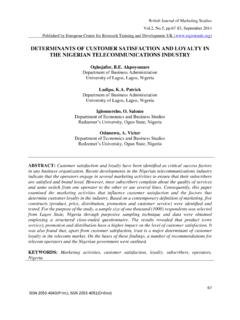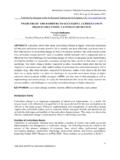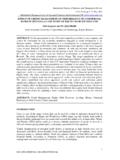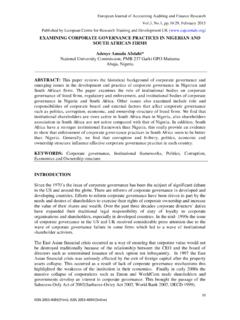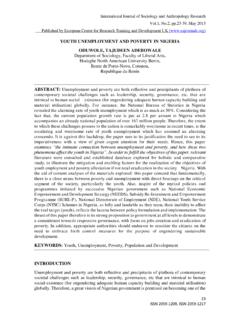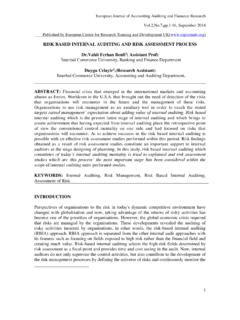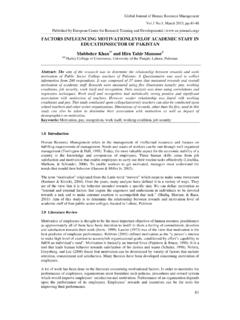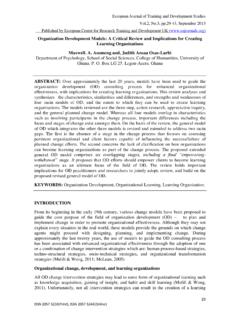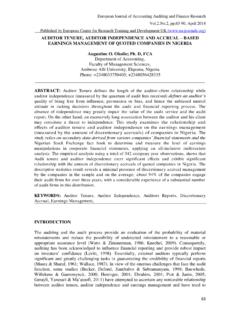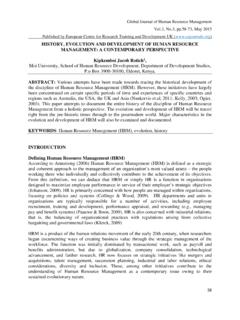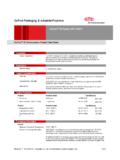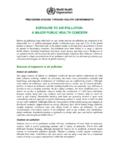Transcription of MUNICIPAL SOLID WASTE DISPOSAL AND …
1 British Journal of environmental Sciences , , , June 2014 Published by European Centre For Research Training and Development UK ( ) 10 MUNICIPAL SOLID WASTE DISPOSAL AND environmental ISSUES IN KANO METROPOLIS, NIGERIA A. W. Butu and Mshelia Department of Geography, Nigerian Defence Academy Kaduna, Nigeria ABSTRACT: The paper examined the MUNICIPAL SOLID WASTE DISPOSAL methods and the environmental issues associated with the management of SOLID WASTE in Kano Metropolis, Nigeria. Primary data were obtained through administration of structured questionnaires to a random size of population in the areas that have the highest heaps of SOLID WASTE on the major streets and open spaces. Oral interviews and field observations were also carried out for holistic and detail assessment of the environment. Secondary data were obtained from desk review method; information on environmental issues resulting from poor management of MUNICIPAL SOLID WASTE were obtained from relevant literatures.
2 The results of the findings clearly show that major streets, several open spaces and even water ways are been used as refuse dump sites. The composition of the MUNICIPAL SOLID WASTE in the city is heterogeneous; it contained both biodegradable and non-biodegradable materials which are mostly e-wastes, plastic and polythene materials. The study also reveals that most of the refuse dumps are left unattended to for a long period. The study further shows that population growth and uncontrolled urban expansion are responsible for the continuous growth of these refuse heaps at the shoulders of the major streets, open spaces and water bodies. There is no organized house to house or street to street collection of the SOLID WASTE in some parts of the metropolis. In few areas where large WASTE bins are provided, they are hardly used by the community.
3 The major environmental issues resulting from improper DISPOSAL and poor management of SOLID WASTE in Kano metropolis are physical nuisance of the WASTE to the environment, the SOLID WASTE are blown around by winds or rainstorm making the environment dirty, the WASTE sometimes block drainage channels during rainstorm causing flooding in the metropolis. The heaps of the SOLID WASTE serve as good hideouts for reptiles, rodents, and other dangerous insects. The SOLID WASTE may decompose to emit methane gas which contributes to climate change. Most of the non-decomposable SOLID wastes contain harmful chemical elements which have severe health implications. Generally, the study shows that soil, air and water pollution in the study area are caused by both pathogenic and chemical elements from these heaps of SOLID WASTE that dot some of the major streets and open spaces.
4 Therefore, the paper recommends that a strong legislation with severe sanction be put in place and they should be a continuous public enlightenment on the danger of MUNICIPAL WASTE to the general public. It is also recommended that available market be created for these WASTE that can be recycled. KEYWORDS: Biodegradable, Non-Biodegradable, Chemical Elements, Electronic Wastes, Environment, Harmful, Management, Metropolis, Refuse Dumps, SOLID Wastes INTRODUCTION The problem of MUNICIPAL SOLID WASTE (MSW) in developing countries is a major concern to government; this problem becomes much worrisome in Nigeria where the production is always on increase because of increase population pressure and some socio-economic factors. Omole and British Journal of environmental Sciences , , , June 2014 Published by European Centre For Research Training and Development UK ( ) 11 Alakinde (2013) observe that Nigeria among other third world countries is witnessing an unprecedented growth of cities in recent time.
5 They observe that the country s high population figure has series of implications for every aspect of people socio-economic and cultural life style. They further state that with the pressure in urban population, existing facilities such as water, electricity, road, educational institutions and housing become inadequate and SOLID WASTE generation and DISPOSAL take unprecedented precarious dimension. Rapid industrialization and population explosion in Nigeria has led to the migration of people from the rural areas to the cities, which generates a lot of MSW on daily basis and indeed the amount of MSW is expected to increase significantly in the near future. Presently, the rapid population increase due to urbanization in Kano metropolis has caused difficulties for the environmental Protection Agency in providing an efficient and effective management system.
6 Urbanization affects land use and when not properly controlled causes emergence of illegal structures and neigbourhoods which is the characteristics of some quarters within Kano metropolis. This has affected the city master plan, thereby affecting social services such as WASTE collection, and eventually leading to indiscriminate dumping of WASTE in illegal areas. MUNICIPAL SOLID WASTE are regarded as discarded materials arising from operational activities taken place in different land use such as residential, commercial and industrial. Domestic or residential wastes are those that are collected from dwelling places on a regular basis, such WASTE include organic matter resulting from preparation and consummation of food, rags, nylon and ashes are the remains after various cooking and heating processes.
7 The commercial wastes are those that arise from shops, supermarkets, market and others; they include paper carton, polythene bags and nylons. The industrial wastes are those WASTE materials that arise from industries; these could be SOLID , liquid, sludge or emotive title attached to them like toxic, hazardous and special WASTE . The industrial WASTE include metals, scraps, chips and grits from machine, shops, sawdust, paper pieces and glass (Omole and Alakinde 2013). Kenneth and Huie (1983) also classified SOLID WASTE into three categories, namely; garbage, ashes and rubbish. The garbage includes organic matter resulting from preparation and consumption of food. Ashes include remains from cooking and heating process and the rubbish may either take the form of combustible such as paper, rags, wood, leaves and weeds or non-combustible such as glass, plastic, polythene and metal materials.
8 SOLID WASTE management is a global issue that is a growing source of concern in developed and developing countries due to increase urbanization; changes in consumer pattern and industrialization, which all directly influence SOLID WASTE generation (Kadafa et al., 2013). Adedibu (1993) is of the view that the nature and composition of SOLID WASTE is a product of climatic and business activities in urban centres. He argues further that most of the agricultural produce such as maize, cassava, vegetables, millet are brought unprocessed during the rainy and harvesting seasons from the nearby farms. The composition of refuse generated in an area determines the type of DISPOSAL method suitable for a particular form of WASTE and the effectiveness of a collection system depends on the cooperation of households and individuals in various sectors of the city in providing containers for storing refuse in accordance with the regulation and regularly placing the materials for collection (Afon, 2003).
9 Abumere (1983) links socio-cultural factors to land use pattern such as housing density and eating habits. He further states that SOLID WASTE accumulation is a product of chaotic land use pattern, the number of household living and that the eating habit in a house British Journal of environmental Sciences , , , June 2014 Published by European Centre For Research Training and Development UK ( ) 12 greatly determines the composition of refuse generated. Abila and Kantola (2013) are of the view that MUNICIPAL WASTE management problems in Nigeria cut across concern for human health, air and water and land pollution among others. Adewole (2009) argues that continuous indiscriminate DISPOSAL of MUNICIPAL SOLID WASTE is accelerating and is linked to poverty, poor governance, urbanization, population growth, poor standards of living and low level of environmental awareness.
10 One notable environmental problem that has bedeviled the nation since the 1970s is MUNICIPAL SOLID WASTE . MSW affects the environment in different parts of the globe. In Nigeria the oil boom of the 1970s had resulted into increase in the volume of individual, commercial and industrial activities in towns and cities of the country. These gave birth to many environmental problems such as flood, erosion, SOLID WASTE materials, global warming, desertification/drought and pollutions. Miller (1994) defines WASTE as man s unwanted materials that need to be discarded. Adegoke (1990) defines WASTE as substances and materials which are disposed of or are required to be disposed of according to the provision of the national law. Miller (1993; 1994) defines SOLID WASTE as any unwanted or discarded material that is not liquid or a gas.
